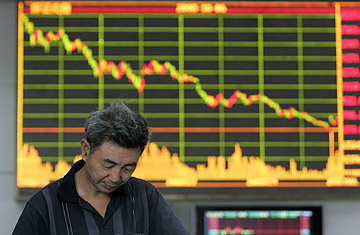
A man reads information on an electronic screen at a brokerage house in Shanghai on Oct. 6. China's stock market, resuming trade after a weeklong national holiday, opened lower in response to sliding overseas markets and fears of a global economic slowdown
In Beijing's corridors of power, economic-policy makers are said to be watching in horror as a U.S.-led financial meltdown gathers force around the globe. According to the rapidly congealing conventional wisdom, China, ostensibly the world's economic superpower-in-waiting, is taking copious notes on how not to run a financial system.
But that picture is only partly correct. That China is watching the meltdown with alarm is certainly true. The global economic slowdown on the tail of the financial-market blowout is already clear and present on the mainland. In what has been one of the world's prime economic engines for the past five years, growth is slowing fast. Look only at the price of steel — as useful an industrial proxy for China's economic boom as any. According to Mysteel, a Shanghai-based consulting firm, the price for products used primarily in construction have fallen to less than $590 per ton, down almost 20% in just four months, forcing some companies into the red in what had been a booming industry. Baosteel, one of China's largest steelmakers, has cut prices twice since August, and its CEO is glum: The era of rapid growth for China's steel industry "will soon be remembered as history," says Xu Lejiang.
But fears that the fallout from the U.S. subprime mess might cripple reform of China's financial system — now only partly open to the world — may be overwrought. Earlier this week Beijing sent a clear signal that, notwithstanding the mess in the U.S. and Europe, it still seeks to develop, slowly but surely, a more sophisticated capital market. China's State Council has approved a plan to allow margin trading and short-selling, giving domestic investors in China's A-share market "new opportunities to hedge and leverage their positions," says Jing Ulrich, head of China Equities at JPMorgan Securities in Hong Kong.
The timing of the move was extraordinary and should be seen as a sign of relative confidence. It came, as Ulrich put it, in "stark contrast with major offshore markets — including the U.S., where regulators temporarily banned short-selling in recent weeks." And leverage — using borrowed money to buy or sell shares — is now viewed by politicians in the U.S. as the root of all financial evils. But the experiment in China is aimed at boosting sentiment in a stock market that has been crushed over the past year, for reasons only partly related to the global equity slump. Regulators in China hope the measure will increase liquidity and trading volume in China's markets after a decline of more than 60% so far this year. (After Monday's global rout in stocks, the Shanghai exchange ended up a tick in Tuesday's trading.)
China's markets, of course, have a long way to go before they are as open and accessible to global capital flows as those in New York, London or Tokyo. But Chinese regulators believe the slow, deliberate pace of reform has helped insulate the country from the worst of the current market turmoil. Consider China's banks. Five years ago, by all accounts, they were a disaster area, plagued by bad loans, lack of capital and poor management. In 2003 nonperforming loans made up 17.9% of their total portfolios, according to government figures. By the end of last year, that figure had plunged to just 6.7%. Over the same period, according to a study by Nicholas Lardy of the Peterson Institute of International Economics in Washington, the percentage of banking assets in China that meet state-mandated capital-adequacy requirements — a bedrock measure of health for lenders — jumped to 79% from just 0.6%. "China's banks," says Lardy, "have been largely transformed over the past decade."
That doesn't mean China hasn't been nicked already by the crisis. It has. Its banks have an estimated $12 billion in exposure to subprime debt in the U.S., a figure some analysts believe is understated. Its sovereign wealth funds have lost tens of millions of dollars on poorly timed investments in Blackstone, a private-equity group, and Morgan Stanley. And Ping An Insurance, China's second largest insurer, lost 70% on its $2.7 billion investment in Fortis, the Dutch-Belgian financial-services company that collapsed last week.
But future risks for China, most analysts believe, are tied more to the second-order effects — the global macroeconomic fallout from the crisis — than to the subprime credit crunch itself. "China's exposure comes from its concentrated bet on the dollar and the risk that the U.S. policy response to a slowing economy and investors' aversion to U.S. debt will combine to put pressure on the dollar going forward," says Brad Setser, a former U.S. Treasury Department official now at the Council on Foreign Relations. That would mean further upward pressure on China's currency, the renminbi, at a time when the country's exporters are already hurting from slowing global growth. That in turn could slow growth even further domestically.
The good news for China and its trading partners is that its banks are relatively well prepared for the current slowdown, and the government has already cut interest rates once in response to slowing growth and has ample leeway for further cuts. The bad news is that it's probably going to need it.
(Click here for photos of the global financial crisis.)